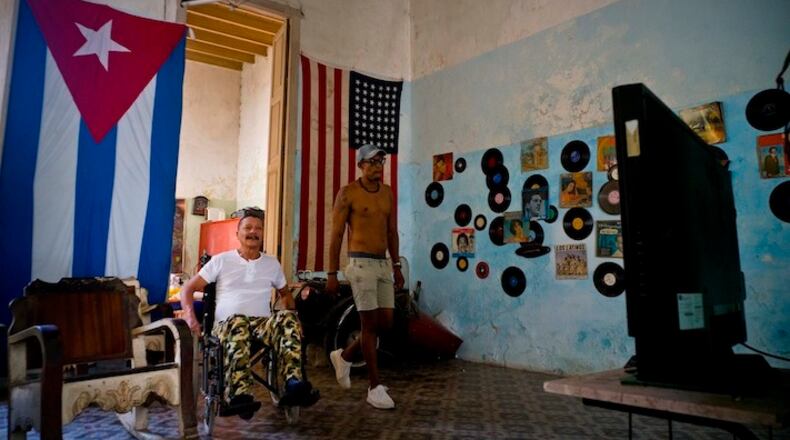Sitting on a dusty curb in this Mexican city just steps from the U.S. border, Eliannes Matos Salazar thinks back to when then President Barack Obama visited Cuba 10 months ago.
Like many Afro-Cubans, the 32-year-old shopkeeper from Guantanamo was inspired by the president's speech about change and the bridge between the nations. She admired Michelle Obama's grace and the couple's rise to such a high position of power.
But that was before Jan. 12, when Obama canceled the two-decade-old "wet-foot, dry-foot" Cuba immigration policy and ripped Matos from her husband — who had been allowed to cross into the United States before the policy's cancellation, while she was kept back. It ended her dream of life in the United States.
"I thought he could help us," she said of Obama. "He went to Cuba and spoke very well. But now — with this — I won't forgive him."
Wet-foot, dry-foot had given Matos and other Cubans an extraordinary advantage over migrants from other countries by allowing any Cubans who touched American soil to enter, even if they had no visas. With its cancellation, Cubans without valid humanitarian and asylum claims face the same hurdles to U.S. entry as any undocumented migrant from, for example, Mexico or El Salvador.
The policy's cancellation turned Cuban immigration on its head. But it did more than that. In a flash, it turned Obama's hero image into one of revulsion among Cuban migrants. And it paid major dividends to the reputation of Donald Trump, whose tough talk on Cuba policy and immigration had made him a figure of fear. No more.
"Trump. Trump. Trump," a group of about two dozen Cubans chanted during a demonstration at the end of the International Bridge No.1, the span that links Nuevo Laredo with Laredo, Texas, across the Rio Grande.
"We beg you Donald Trump. Please help us," read a sign held by Henry Valdez of Mantanzas.
Valdez, 25, had traveled months to get to this point only to be turned away at the last hour — one of hundreds, if not thousands, who now look to Trump to let them in.
Ironically, they'd been rushing to get into the United States before he was sworn in.
Since Trump's election victory Nov. 8, the number of Cubans processed in Laredo had surged — up 55 percent to 4,602 from November to December. Alvaro Moreno, one of the Cubans who made it to the U.S. before the policy's cancellation, said fear of what Trump might do once he'd been sworn in had caused him to rush his arrival.
"When Trump won the election, my plans changed," Moreno said. "The people I was going to travel with got scared and panicked" and hurried their travel — fearing that Trump would erect a wall that would keep out all Latin American immigrants.
Alejandro Ruiz, a Cuban entrepreneur who runs a Laredo safe house known as Cubanos en Libertad that took in newly arrived Cubans, summed up the quick reversal in reputations: Cubans stuck on the border now see Obama as a traitor, he said. Trump is a hero.
"It was a betrayal by Obama," said Abel Diaz Chavez, 41, from Ciego de Avila.
"Our last hope is Trump," said Yamila Gonzalez Cabeza, 44, from Havana.
Fernand Amandi, the principal at Bendixen & Amandi International, who has studied public opinion on the island, said Obama's legacy on Cuba was still being written. If economic improvements take place within Cuba, people's views of Obama will rise. Trump, whose policy toward Obama's Cuban opening is uncertain, could affect it.
"It's still a very fluid situation," he said. "Much of it has to do with what transpires within Cuba. Particularly, if Trump doesn't do anything to upend the policy."
Feelings were still raw at the end of the 1,050-foot bridge over the U.S.-Mexico border days after the end of wet-foot, dry-foot. Denial. Anger. Grief.
On Monday, a group of 60 Cubans who'd arrived too late pulled out markers to make signs. "Obama, our dead shall fall on your shoulders. Freedom now!" read one.
Valdez and Matos told a tale of a journey that many had made: a flight from Cuba to Guyana and on to Venezuela, then a tortuous land journey through the notoriously dense Darien Gap jungle on the Panamanian border. They were arrested in Tapachula, Mexico, where they spent days before being released to continue their journey.
If Matos hadn't been arrested, she likely wouldn't be sitting on a Mexican street corner now. She'd be in the United States. The delay was enough that she was still being processed when her special privilege was canceled.
Her husband, who was in an earlier group, had made it through just minutes before. Matos was turned away, crying about being separated.
"They took my picture," she said. "They took my fingerprints."
Ruiz, the entrepreneur, said he was now looking for a shelter in Nuevo Laredo that could house some 50 to 100 Cuban migrants. He anticipates that as many as 3,000 Cubans could flock to this border city by the end of January or early next month, hoping Trump will change policy _ though there's no hard evidence that he will.
Matos said she could not give up hope.
"I want to be with my husband," she said. "I am confident that the new president is going to change the law."
About the Author
Keep Reading
The Latest
Featured



